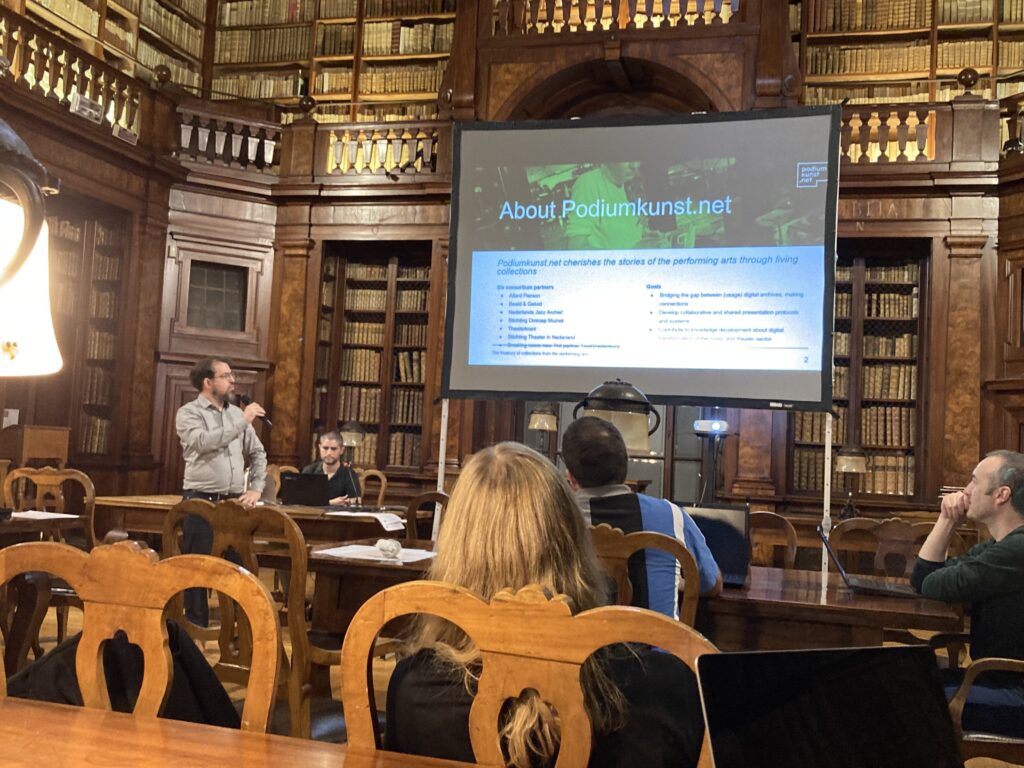Impact stories: the collaboration between Polifonia and Podiumkunst.net
From the beginning of the project, Podiumkunst.net and Polifonia have been in close contact and looked to each other as role models. Our stakeholder Podiumkunst.net reflects on this synergy with a positive outlook. Remco de Boer and Monique in het Veld on the importance of the collaboration and the impact.

From the beginning of the project, Podiumkunst.net and Polifonia have been in close contact and looked to each other as role models. Our stakeholder Podiumkunst.net reflects on this synergy with a positive outlook. Remco de Boer and Monique in het Veld on the importance of the collaboration and the impact.

Connecting heritage
The network and platform ‘Podiumkunst.net’ is also building a knowledge graph in order to provide a digital infrastructure to all kinds of performing arts collections. Since Podiumkunst.net was created for all disciplines within the performing arts sector – including music – it syncs with Polifonia in that specific dimension. “It is of great importance for researchers and other users to make the wealth of musical heritage more visible and to make connections between the various collections and archives,” says Monique in het Veld (programme manager Podiumkunst.net). Increasing the visibility of national and international musical heritage is not the only goal of the collaboration. “The musical heritage should also serve as inspiration for new pieces, for new interpretations of old pieces, making connections between those pieces and the composers, bridging gaps, placing the work in time and so on,” says in het Veld on the motivation to join as a Polifonia stakeholder.
Finding common grounds: alignment of the metadata model
Remco de Boer (information architect ArchiXL & Podiumkunst.net) elaborates on the challenges they faced with the alignment: “since the goal of a knowledge graph is interlinking knowledge and making that knowledge available to (any) third parties, one of the key design decisions is which ‘language’ – or metadata model – to use. Typically, this language addresses the key characteristics of the domain, and must be on the one hand sufficiently generic to be useful for all stakeholders of the knowledge graph, and one the other hand sufficiently specific to express the relevant details and nuances within the application domain. The Podiumkunst.net and Polifonia domains overlap, but there are differences as well.”
The difference lies in the fact that Polifonia focuses only on the music domain, while Podiumkunst.net focuses on the performing arts including music, theater and dance. In that respect, the RDA metadata model used by Podiumkunst.net is broader but also more superficial than the Polifonia Music Meta ontology because Podiumkunst.net wants to generalize across all performing arts.
Remco continues: “It would be a mistake to consider one of the approaches ‘better’ than the other, since both address their own specific use cases. At the same time, it would be a mistake to consider both approaches as completely disjunct, since there is a clear overlap in interest for the music domain. Because of this overlap, Podiumkunst.net has been involved as a stakeholder in the Polifonia project. Our goal was to learn from the developments within Polifonia, to share knowledge and inspiration, and to find the points at which our domain languages touch and interact.”
The value of a broader international perspective
In October 2023, a joint working session during the Stakeholder Day in Bologna led to an alignments between the Podiumkunst.net metadata model (RDA) and the Polifonia Music Meta ontology, which will provisionally facilitate the interconnection of Podiumkunst.net resources with Polifonia KGs and other resources on the Web. A cornerstone of this alignment is the recognition of the concept Work in both models, to which each of the initiatives add semantics particular to their domain.
Remco de Boer reflects on the fruitful synergy; “In our experience, participating as a stakeholder in a European project such as Polifonia provides an excellent opportunity to discuss nationally oriented developments such as Podiumkunst.net in a broader international perspective, and to develop a shared understanding of how and where these initiatives complement each other.”










